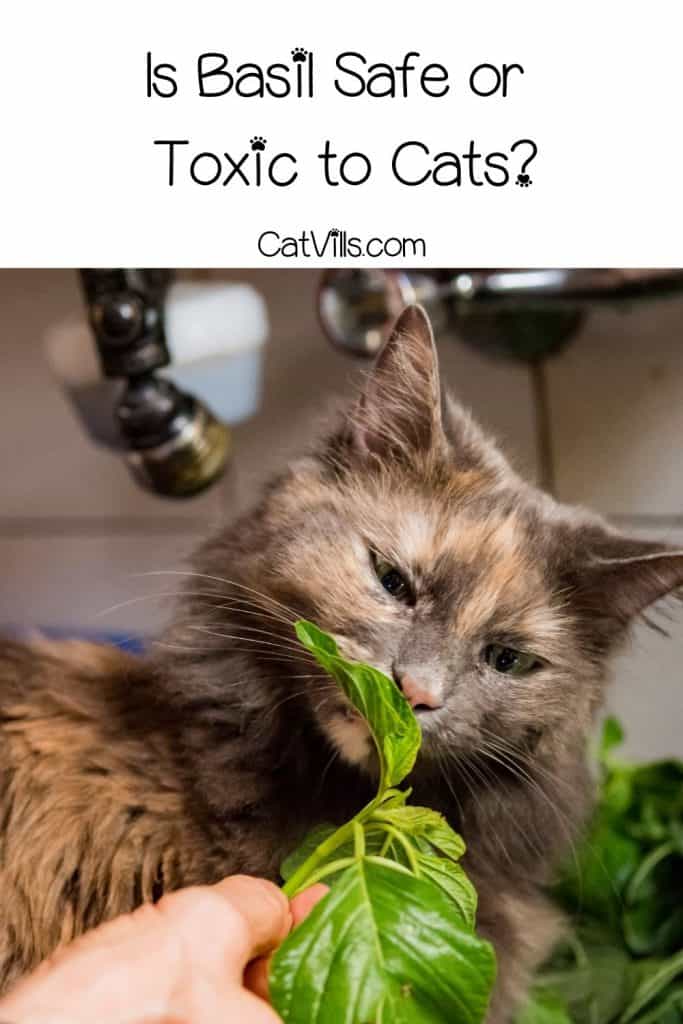Last Updated: 2 years ago
So, you love basil; you keep it handy in your kitchen and think its flavor makes anything taste better.
The problem arises when you see your cat munching on the basil lying around, and he does that often.
This habit of his has you wondering, can cats eat basil?
Read along as we answer everything related to your cat eating basil.
Is Basil Safe For Cats To Eat?
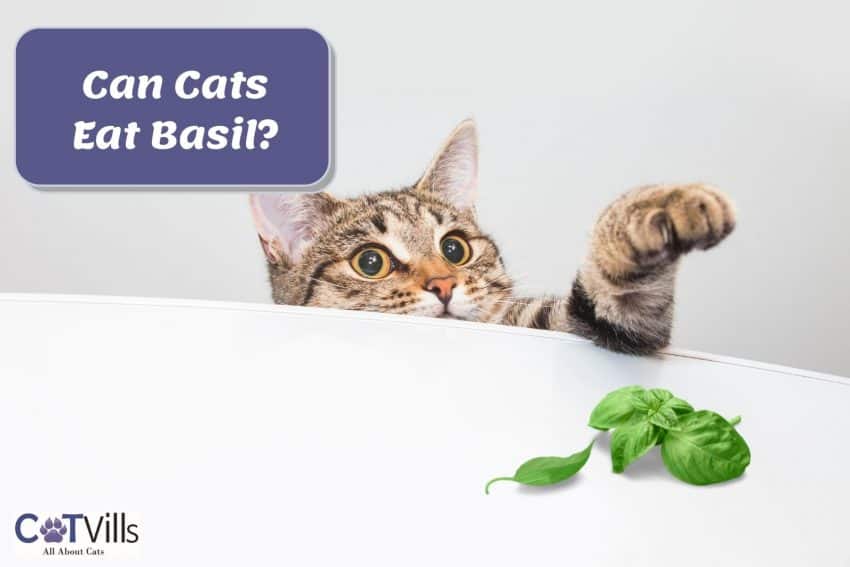
Yes, cats can certainly eat basil. That’s the short answer, but your cat’s health is far more essential to settle for than just one-word answers.
The detailed response to that question requires a bit more context about basil and its effect on your feline’s body.
Cats will just take anything they want-as cats are a curious bunch. If they are interested in finding out what something is, they will sniff around a bit before putting it in their mouth.
Cats can undoubtedly munch on a few basil leaves or even when they are in cooked form, but there are good reasons why you shouldn’t encourage that.
Read along to find out why your cat is better off basil.
Is basil poisonous to cats?
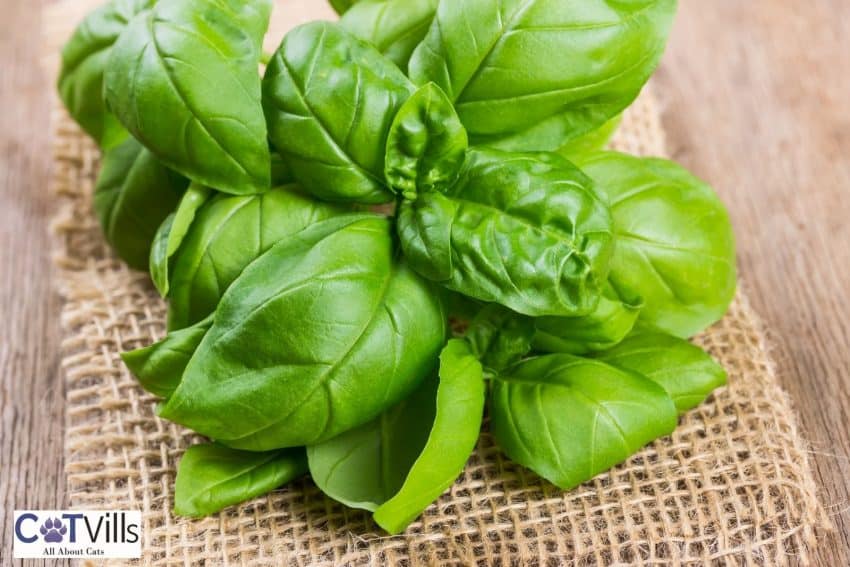
No, basil is not poisonous to cats. Unlike cinnamon, cats are not even allergic to basil.
Whether it’s in dry leaves form, fresh leaves, or even cooked up, consuming basil is not toxic to cats. Basil in all its form is non-toxic to cats.
So, there’s no need for worry if your cat just helped itself to the topping of your pizza containing basil leaves.
In some cases, cats get diarrhea and start vomiting after consuming basil, but that’s only because they are carnivores that aren’t supposed to eat vegetation in general.
2 Reasons why cats should not eat basil
Although basil is not particularly poisonous to your cat, there are several valid reasons to keep the herb away from your pet.
Here I have discussed all those reasons one by one in detail. You’ll realize after reading this why it’s a bad idea to give basil to your kitty.
#1 Can cause diarrhea
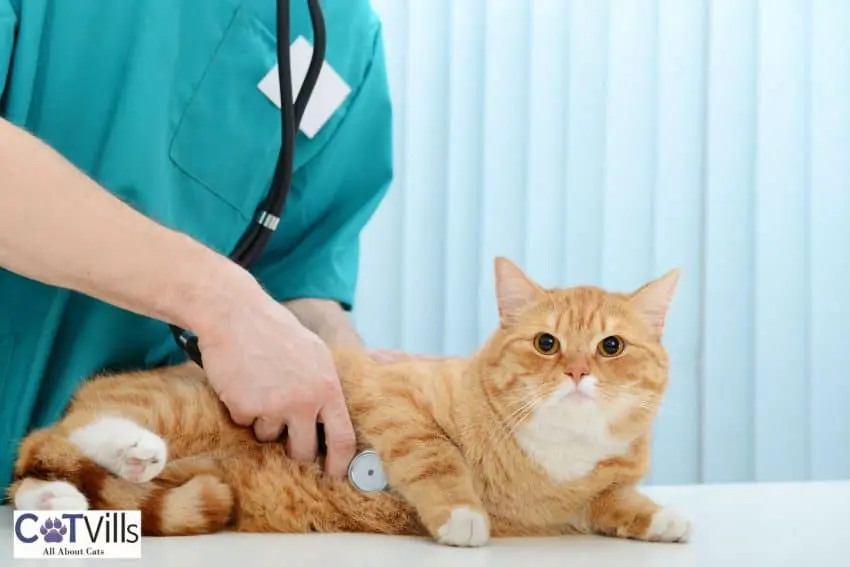
Any change in the diet of your cat has the potential to upset its stomach. Basil, in particular, can cause diarrhea to your cat. In which case, you should stop feeding it basil at once.
However, if your cat does end up having diarrhea, don’t make the widespread mistake of not feeding it. You should provide small meals to it every four to five hours.
Your cat’s intestines need meals to heal themselves. A low-fat, carbohydrate diet would be the ideal choice in this case.
Potatoes, rice, pasta, and a small portion of chicken are suitable in case of diarrhea.
#2 Vomiting
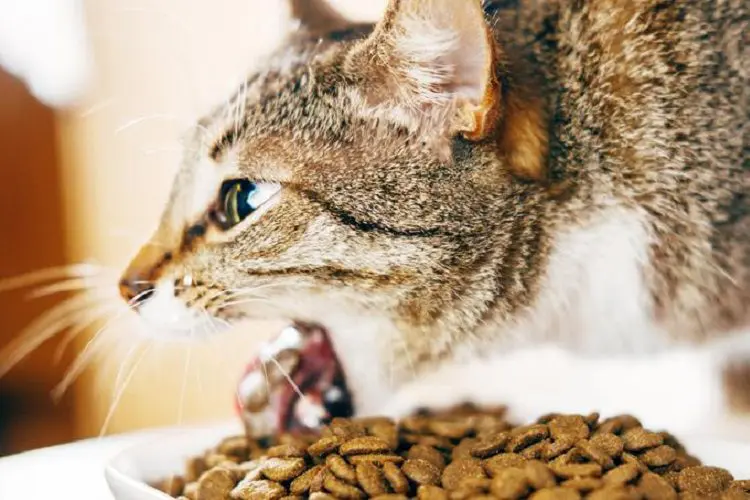
Cats are smart; they learn from experience that chewing on basil (or most forms of vegetation) would lead them to vomit. So, whenever they have slight indigestion, they try to chew onto some leaves.
While this may seem like a helpful way for your feline friend to keep their digestion in good health, it may lead to continuous vomiting.
This can further lead to dehydration and several other health issues. It is, therefore, vital to check that your cat doesn’t overeat basil.
While your cat might not know any better, as their friend, you must. Better to take your cat to the vet in case of any indigestion.
Also, it’s vital to know that if your cat is vomiting, you shouldn’t give him any food for a few hours. These few hours of fasting would provide some much-needed rest to his digestive system.
You can also feed your cat some berries as that would give much-needed fiber.
What to do if cats eat basil?
There is no need to be alarmed if your cat ends up eating some basil. It is a non-toxic herb for cats. You only need to be alarmed if the herb ends up giving diarrhea to your cat.
In that case, it is essential to watch your cat’s behavior for the next few hours or so. If your cat is looking happy and relatively normal, there’s no need to worry.
However, if your cat shows any of the following signs, it’s time to take it to the vet without further delay.
- Loss of appetite
- Lethargy
- Discomfort
FAQs
Are cats attracted to basil?
Not in the same way they are attracted to catnip or catmint. If you find your cat hovering around basil way too often, it might be its general curiosity.
Do cats like the smell of basil?
Basil has a strong aroma. While most cats do seem to like that aroma, it is highly subjective whether your cat likes it or not.
Why is my cat eating basil?
Leading vets believe it might be due to an unsettled stomach. Your cat has probably learned that eating vegetation in case of an unsettled stomach helps it cause vomiting, thus providing some ease.
What spices are toxic to cats?
Onion and garlic can be fatal for your cat as they attack its body’s red blood cells, causing it to be anemic.
They are typically dangerous when eaten in large quantities, but if onion and garlic are in concentrated form in any food item, it’s a good reason to keep them away from your cat.
How to identify Basil?
Basil generally has rounded leaves, with the top surface having a waxy appearance. It has a small shrub-like appearance, and the leaves are thicker than usual.
Conclusion
While basil isn’t particularly toxic to cats, it does have an associated risk of causing diarrhea and vomiting. That is why you should be careful not to feed your cat with it.
Also, if you have a herb garden and your cat seems to develop a liking for basil, it’s essential to keep them away from your feline friend.
If your cat has any exceptional medical condition, always check with your vet before introducing any new food item to its diet.
Can cats have basil? Please share your thoughts on this topic below!
Resources:
